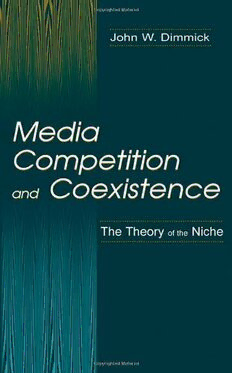Download Media Competition and Coexistence: the theory of the Niche (Routledge Communication Series) PDF Free - Full Version
Download Media Competition and Coexistence: the theory of the Niche (Routledge Communication Series) by John W. Dimmick in PDF format completely FREE. No registration required, no payment needed. Get instant access to this valuable resource on PDFdrive.to!
About Media Competition and Coexistence: the theory of the Niche (Routledge Communication Series)
This volume considers how media firms, as well as entire industries, exist and persist over time despite what often seems to be intense competition for such resources as audiences and advertisers. Addressing competition within and among media organizations and industries, including broadcasting, cable, and the Internet, author John W. Dimmick studies the media industries through the niche theory lens, developed by bioecologists to explain competition and coexistence. He examines the targets of the different media--audience, advertisers, money--and how they compete, using examples from a variety of studies. Each chapter incorporates relevant economic constructs into the analytic framework. This approach includes the use of economics of scale to explain selection and firm mortality in newspapers and movie theaters; the application of the transaction costs concept to explicate the rise of advertising agencies; the employment of the strategic group concept in analyzing the niche breadth strategy; and the measurement of gratifications-utilities. A comprehensive overview of the determinants of media competition and coexistence, Media Competition and Coexistence: The Theory of the Niche offers unique insights for scholars, students, researchers, and practitioners in media economics, management, and business.
Detailed Information
| Author: | John W. Dimmick |
|---|---|
| Publication Year: | 2002 |
| ISBN: | 9780805837872 |
| Pages: | 158 |
| Language: | English |
| File Size: | 8.484 |
| Format: | |
| Price: | FREE |
Safe & Secure Download - No registration required
Why Choose PDFdrive for Your Free Media Competition and Coexistence: the theory of the Niche (Routledge Communication Series) Download?
- 100% Free: No hidden fees or subscriptions required for one book every day.
- No Registration: Immediate access is available without creating accounts for one book every day.
- Safe and Secure: Clean downloads without malware or viruses
- Multiple Formats: PDF, MOBI, Mpub,... optimized for all devices
- Educational Resource: Supporting knowledge sharing and learning
Frequently Asked Questions
Is it really free to download Media Competition and Coexistence: the theory of the Niche (Routledge Communication Series) PDF?
Yes, on https://PDFdrive.to you can download Media Competition and Coexistence: the theory of the Niche (Routledge Communication Series) by John W. Dimmick completely free. We don't require any payment, subscription, or registration to access this PDF file. For 3 books every day.
How can I read Media Competition and Coexistence: the theory of the Niche (Routledge Communication Series) on my mobile device?
After downloading Media Competition and Coexistence: the theory of the Niche (Routledge Communication Series) PDF, you can open it with any PDF reader app on your phone or tablet. We recommend using Adobe Acrobat Reader, Apple Books, or Google Play Books for the best reading experience.
Is this the full version of Media Competition and Coexistence: the theory of the Niche (Routledge Communication Series)?
Yes, this is the complete PDF version of Media Competition and Coexistence: the theory of the Niche (Routledge Communication Series) by John W. Dimmick. You will be able to read the entire content as in the printed version without missing any pages.
Is it legal to download Media Competition and Coexistence: the theory of the Niche (Routledge Communication Series) PDF for free?
https://PDFdrive.to provides links to free educational resources available online. We do not store any files on our servers. Please be aware of copyright laws in your country before downloading.
The materials shared are intended for research, educational, and personal use in accordance with fair use principles.

